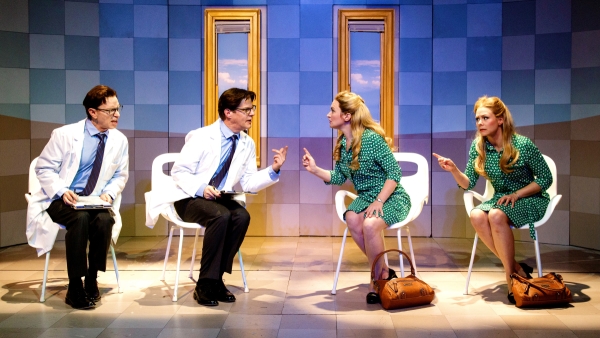"Hope Springs Eternal" in Lives of the Saints, Says Playwright David Ives
With work ranging from a Tony-nominated adaptation of the 1870 sadomasochistic novel Venus in Furs to a glistening updated book for Irving Berlin's White Christmas, David Ives is one of the most diversely talented playwrights working today. In fact, when he hit the New York theater scene in the '70s and '80s, Ives first gained recognition for something totally different: one-act comedies, several of which were quickly compiled into the hugely popular All in the Timing.
Ives continues to produce as wide a range of work as ever (his adaptation of the French farce The Metromaniacs is currently premiering in Washington, D.C.), but he's also returning to his roots with Lives of the Saints, a world premiere collection of short plays now being presented by Primary Stages at the Duke on 42nd Street. Though Ives feels he "exhausted" himself "in one-acts for a while," this production — a continuation of Ives' nearly two-decade artistic relationship with director John Rando — finds the author refreshed.
He returns to the format, because even though he has "little patience with lots of other plays," he says, "hope springs eternal in the one-act evening."

(© James Leynse)
How new are these plays?
Three are very recent: Goodness of Your Heart, Life Signs, and It's All Good; three are New York premieres; and one is neither of those things. Lives of the Saints is the only one of these plays that's ever been done in New York. That's actually my favorite of any play I've ever written. And the other plays, they're probably from around [the year] 2000 or so.
What attracts you to writing one-acts?
There's the despair that settles over as in the first two minutes of a two-hour play, you realize that you are sunk — that you are going to have to sit through this play for two hours and it's never going to be a different play. The nice thing about having seven one-act plays is that if you're not interested in this play, you have hopes for the next. And so hope springs eternal in the one-act evening.
It's [also] a very rich form. You can do so much in ten minutes or twelve minutes. One-act plays are really much closer to poetry than they are to drama because they tend to be a single burst of emotion or thought or an idea and you don't have to sort of spread it out over ninety-two minutes. There's a Beckett play [that] is literally one-minute long and it's a great play. So I admire the concision and the concentration of one-act plays.

(© James Leynse)
One of your plays, The Goodness of Your Heart, seems to be making the same point as A Delicate Balance — in ten minutes.
It is so interesting you say that because I was thinking that just the other day. I'm not kidding. A Delicate Balance is the play that made me want to be a playwright. I saw it when I was 17 with Hume Cronyn and Jessica Tandy when it passed through Chicago, and I just thought it was the most exciting thing I'd ever seen. So I was thinking about [The Goodness of Your Heart] and thinking, it's A Delicate Balance. I've obviously been trying to write that play for, you know, decades and now I finally did, and it's off my chest.
How would you say Lives of the Saints compares with your previous one-act evenings?
I think the evening as a whole feels more personal than the other two evenings of one-acts I've had in New York…[And], you know, All in the Timing was too clever by about ninety percent. These plays are less on the clever side, and I think they're more thematically related. None of my other evenings, to my knowledge, had a play like Goodness of Your Heart or It's All Good in it. So we're being a little braver in expanding the palette, and when I say we, I mean John Rando and I.
How has your collaboration with John Rando continued to grow?
It can't grow because it was always massive and wonderful. Working with John has been the same for, god, I don't know how long we've been working together, eighteen years maybe. He and I are simply on the same wavelength. So when we put a show together, we just think together…It's like working with a second self.
There are also several actors in this production whom you've worked with in the past?
All of them, actually. Arnie Burton goes way back to twenty years ago when we did Time Flies. In fact, I'm sitting in my writing room at the moment and I'm looking up over my writing desk at the pair of mayfly wings that he wore in that play because he played a mayfly who was out on a date with another mayfly and realized they only had twenty-four hours to live.
That's quite tragic.
It is, but it's funny when you actually see the play, because it's very sweet. They realize that they only have so much time. So, carpe diem.
The line between funny and tragic is one you hit a lot.
I like that line. I like to show how thin that line can be. [laughs]
Your plays also tend to explore questions.
If a play isn't exploring a question, I don't know why I'm sitting in front of it. I think that's what theater is. It's people standing up in front of us and exploring a problem. It's the ultimate existential art because you have people standing in front of you actually working on something. And that is what I think a playwright's job is, which is why I have so little patience with, I must say, lots of other plays.










